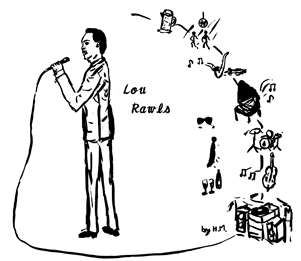

I heard his name for the first time when I listened to Arthur Conley's Sweet Soul Music (in Japan it had formerly been titled as Let's Go Soul ! ). This 1967 hit was arranged by Otis Redding and Conley on the basis of Sam Cooke's Year Man and it was a soul tribute in which the names of famous soul singers like Sam & Dave, Wilson Pickett or James Brown were called one after another along with joyful horns and articulate rhythms (I by myself call such a tune 'bandwagon'). While Otis hard-headedly put his own name in the lyrics, there is another name who is not so familiar to Japanese soul freaks in particular. Who is 'Lou Rawls'? I thought so but I didn't feel like searching and hearing his songs at that time. Next time I heard him on Sam Cooke's Bring It on Home to Me (you can get it in your ear on Sam's "Greatest Hits" and so on). This is one of the most soulful tunes among his strings-ridden and sweetened songs, and Sam Cooke's mellow and strong tenor is accompanied by a well impressive baritone like a shadow. This turned out to be Lou Rawls and I began to be more interested in him. The 4-CD box set compilation "Soul Spectacular!" contains Sweet Soul Music and his Love is a Hurtin' Thing which is taken in the former's lyrics. Aside from many other male soul tenors, I find an adult's presence of mind in his voice with the broad but unexcessively sentimental arrangement. You may find yourself surprised with his versatality when you search his career and transition of musical style.
He was born and bred in Chicago and joined in the church choir on the one hand, and he was said to be fond of and listen to big band singers including Joe Williams or Billy Eckstine on the other. After some stays in several gospel groups he joined the Pilgrim Travelers and often toured with Sam Cooke, the former member of a group Lou also stayed in and the man converting himself to secular music with a hit You Send Me. However, one day the car they rode in crashed into a truck. Sam only suffered some slight injures but Lou got serious ones and temporarily in a coma. After recovering from it, Lou Rawls turned into secular music as a solo singer. This was the accident in which I think about several things including the fact that the secular Sam Cooke, who had gained much popularity in the gospel field, and a gospel group took same gigs or the bright and dark fate between two, however, it might be that Lou changed his mind as "Since I almost lost my life, I want to do something worth while". After cutting a single at a small label, Lou signed up for the corporate label Capitol and made his debut album "Stormy Monday". This album is backed by a pianist Les MaCann's trio and contains pre-war blues which Lou reads in the classy jazz style, not in the stressed gospel one. Some sides on "Greatest Hits (Curb)" are jazz standards which Frank Sinatra also sings. Those are corporate labels' choices until '60s, when such companies kept R&B or soul at a distance.
And then his breakthrough hit "Live!" was released. What a beautiful work! This is the live at the Capitol studio along with a jazz quartet, and especially, the medleys of the water-flowing monologue about things and persons and the following smooth rendition, Southside Blues~Tobacco Road and Street Corner Hustler's Blues~World of Trouble are sublime. This is far from many live albums which are ready for making a fuss from the start, and you can grasp the excitement brought gradually from the calmer audience as if you were very near at hand. Such a competent man came to sing soul with the current of the times. While the next album "Soulin'" contains many tunes for his old jazz or standard fans (such as his reading of Autumn Leaves), his Capitol years best "Anthology" let you hear soulful tunes with solid arrangements of David Axelrod's orchestra. Not to mention Love is a Hurtin' Thing, the way of from-monologue-to-reading medley of Dead End Street and the surging Your Good Thing (Is About to End), Stax singer Mable John's original, and so on. Lou Rawls soul actually stays with the still and the move.
After leaving Capitol he also had a cool MGM tune Natural Man, a social-conscious and mid-tempo groover beginning from monologue to reading, which you can hear on "Greatest Hits (Curb)" . In '76 he had one more hit of You'll Never Find Another Love Like Mine in Philadelphia International (PIR). This is an adult-oriented disco tune and you can hear on his PIR years best "Groovy People" with Groovy People, Lady Love, See You When I Git There and more. As for me, I sometimes feel the disco rhythms in this period slighter and duller. You may find Lou's voice still alive when you hear the commercial of Budweiser or today's albums ranging from gospel to Sinatra (After I wote above, he passed away. Let me tell him rest in peace). Ironically in Japan Lou Rawls is overlooked because of his versatality in various kinds of music, however, you can realize his virtue when you listen to a series of tunes with sure technique and appeal of his voice. (2005/09/13)(2007/08/19)